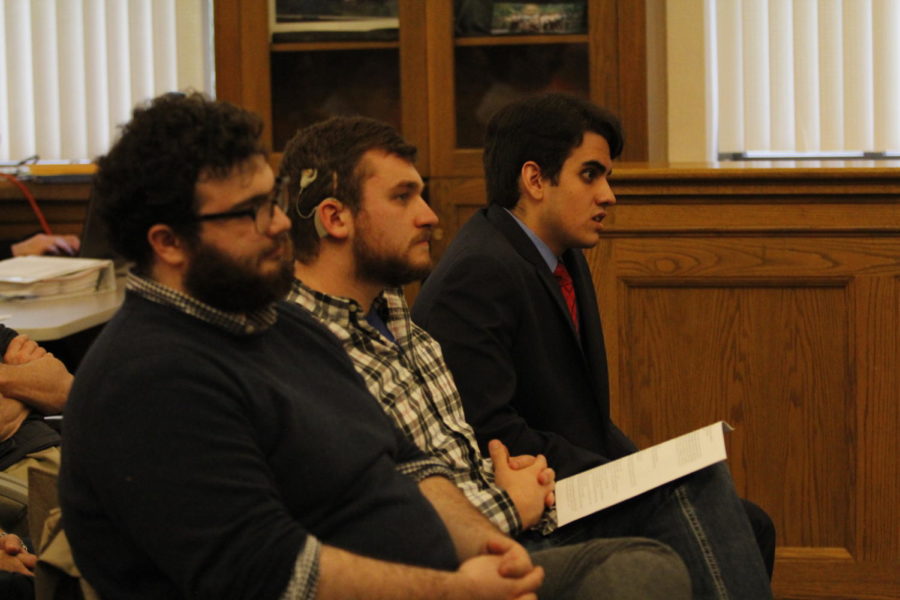- App Content
- News
- News / Politics And Administration
- News / Politics And Administration / Campus
- News / Politics And Administration / City
City council ex-officio pushing for education, accountability in addressing rental housing issue
Future Student liaison Robert Bingham, Kody Olson, and recently appointed member of Ames Transit board Juan Bibiloni at Tuesday night’s city council meeting.
September 14, 2017
After a much deliberated housing discussion during the city council meeting Tuesday, ex-officio Robert Bingham offered a student perspective to the issue.
The city council heard from several city staff members during the meeting, as well as neighborhood representatives — specifically the South Campus Neighborhood Association [SCAN] — on what should be the next steps in addressing rental properties in Ames.
Currently, the city of Ames limits the number of people in rental units to one family or three unrelated people.
Due to a state law passed during the most recent legislative cycle, the ordinance will be moot after Jan. 1, 2018 when the state enforces that cities may not restrict occupancy based on familial or non-familial status.
For SCAN, this is a major concern as many residents vocal during the city council meeting are worried that if occupancy is not restricted in some shape or form their neighborhood would inevitably turn into a “student slum.”
“What the council is looking for, what SCAN is looking for, is two things: one, put a cap on the amount of occupancy, which is the number of people per household in single-family dwellings and duplexes,” Bingham said. “They are also asking for a cap on percentages of rental properties in a given block.”
Based on these requests, the council motioned for city staff to determine the proper unit of analysis for the percentage per block or subdivision and to limit three students per household.
“Student is not a protected class, so they can discriminate or categorize based on that,” Bingham said. “Which I’m thoroughly opposed to.”
Bingham is hesitant about these motions because he feels there are places in the SCAN neighborhood, as well as other neighborhoods west of campus, that have more than three bedrooms available that will then go underutilized.
“They’re going to have to up charge more to make up the deficit,” Bingham said. “Thus affecting students.”
This notion was shared by several landlords that the city heard from during a workshop in August to get a better grasp of possible solutions to the issue.
The landlords, in comments and questionnaires reported by the city, felt that the city should not be proactive in establishing a new ordinance to replace the old, but to instead wait to see what happens.
And if the city were to instill an ordinance, they believed rental properties should restrict the number of adults by bedroom instead.
Some neighborhood representatives, such as SCAN, disagree.
“It was very clear that they don’t have an issue with renters, they have an issue with student renters,” Bingham said.
The approach Bingham feels is best is rooted in both proactive and reactive solutions. He believes if students were better educated on renting, if there was more accountability to follow existing codes by the tenants and landlords and more enforcement, that the issue could then be resolved.
“It’s all about education and enforcement at this point,” Bingham said. “I think this is a community issue and students are part of this community. I don’t think that we should make students the devil and I don’t think we should assume all students are a threat. The vast majority of [students] are good residents in Ames. They are good tenants and they want to do what’s right.”
As far as Bingham is aware, there has been little to no input from students on this issue.
“I think it’s a lack of education on the renter’s and landlord’s part so they don’t know what is expected of them,” Bingham said. “This is an issue that we can come together and tackle, but we should not be singling out students or homeowners.”
For those impacted by this issue and who would like to provide input, Bingham suggested going to city council meetings, reaching out to him or a Student Government representative.
“The main thing is just reach out,” Bingham said. “There is a wealth of opportunities.”
















